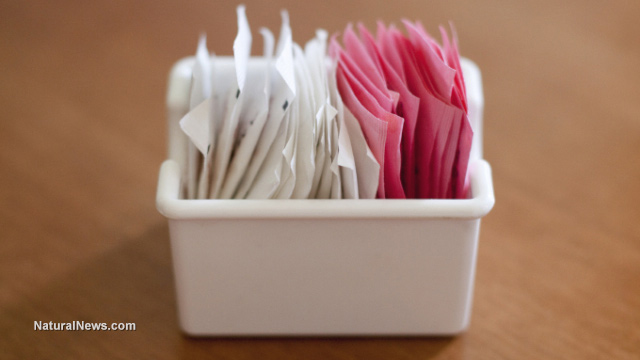
Sugar can destroy your health – there’s no doubt about it. However, if you think you’re doing your body any favors by switching to artificial sweeteners, you couldn’t be more wrong. They may have fewer calories, but they can be just as bad for your health – and your waistline – as regular sugar, if not worse.
Weight loss is often boiled down to a simple formula of calories in versus calories out. Unfortunately, many people fail to realize that no-calorie sweeteners can raise your risk of obesity and Type 2 diabetes even more than sugar. Lots of studies have illustrated this connection, and a new one that was recently presented at the San Diego Experimental Biology conference can now be added to the pile of compelling research showing why you shouldn’t turn to these chemicals.
The study tested how sweeteners like aspartame and acesulfame potassium, as well as sugars like fructose and sugar, affected animals. After three weeks of a diet high in one of those four ingredients, all of the animals studied had higher blood lipids. However, those taking artificial sweeteners also had the substances accumulated in their blood, damaging their blood vessel lining significantly. This effect was particularly pronounced in the group taking acesulfame potassium.
The finding shows how artificial sweeteners change the way your body produces energy and processes fat all the way down to the cellular level. The chemical pathways might be different, but artificial sweeteners have the same health effects as sugar.
There’s another twist, however. Although your body is designed to handle moderate amounts of sugar, sweeteners wear that system down. They essentially trick the body, the study’s authors point out, and when it finds that isn’t getting the energy it expects, it takes it from somewhere else, like your muscles. The rats in the study who consumed artificial sweeteners were burning muscle as an energy source.
100% organic essential oil sets now available for your home and personal care, including Rosemary, Oregano, Eucalyptus, Tea Tree, Clary Sage and more, all 100% organic and laboratory tested for safety. A multitude of uses, from stress reduction to topical first aid. See the complete listing here, and help support this news site.
The authors pointed out that many sweeteners were approved before the technology existed to find these effects.
Artificial sweeteners make you hungrier
Research has also shown that artificial sweeteners actually increase your appetite as well as your cravings for carbohydrates, which is another way they can cause you to pile on the pounds. They can also cause metabolic problems that spur your body to store fat and gain weight. For example, a study published in Preventive Medicine in 1986 involving nearly 80,000 women found that those who used artificial sweetener had a significantly higher likelihood of gaining weight compared to women who didn’t use them, no matter how much they weighed at the study’s inception.
Another study that was published in the journal Appetite in 2012 discovered that aspartame and saccharin led to higher weight gain than sugar, and this held true even when subjects’ total overall calorie intake was similar.
A study published in the Journal of Physiology in 2013 showed what happens when your body eats artificial sweeteners. Normally, when you consume something that is sweet, your brain will release dopamine and activate its reward center. This spurs the release of the hormone leptin, which tells your brain you are full when you’ve consumed a certain number of calories, and you no longer feel a desire to eat. However, if you eat something sweet that doesn’t have calories, like artificial sweeteners, the sweet flavor will still activate the pleasure pathway in your brain, but there won’t be any calories there to deactivate it, leaving your body feeling hungry and spurring cravings for carbohydrates.
If you’re trying to give up sugar for your health, don’t turn to artificial sweeteners. Giving up sugar can be difficult because it’s physically addictive, but once you get through those first few days of cravings, you’ll be pleasantly surprised to find that fruits and other foods taste sweeter than they did before, and you could well discover that you don’t miss sugar-laden desserts as much as you thought you would.
Sources for this article include:
WakingTimes
NaturalNews
